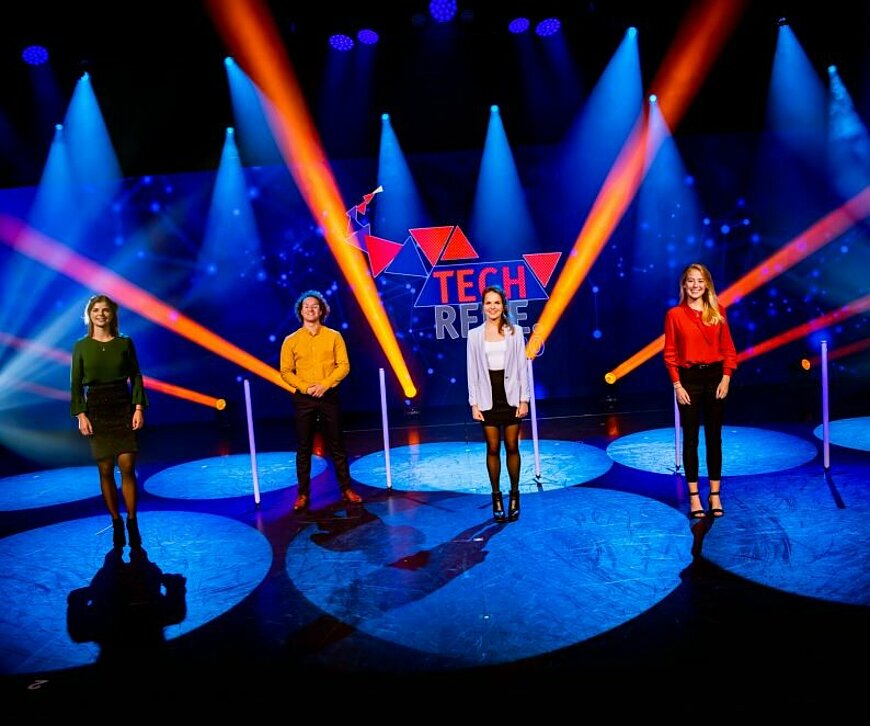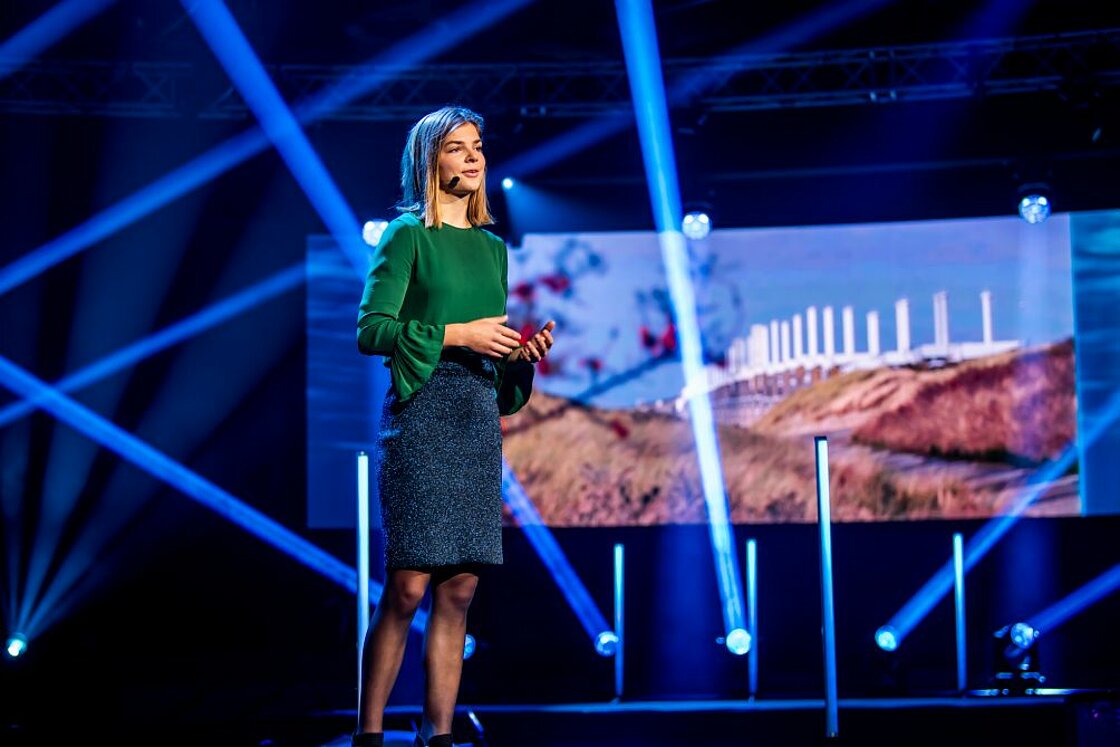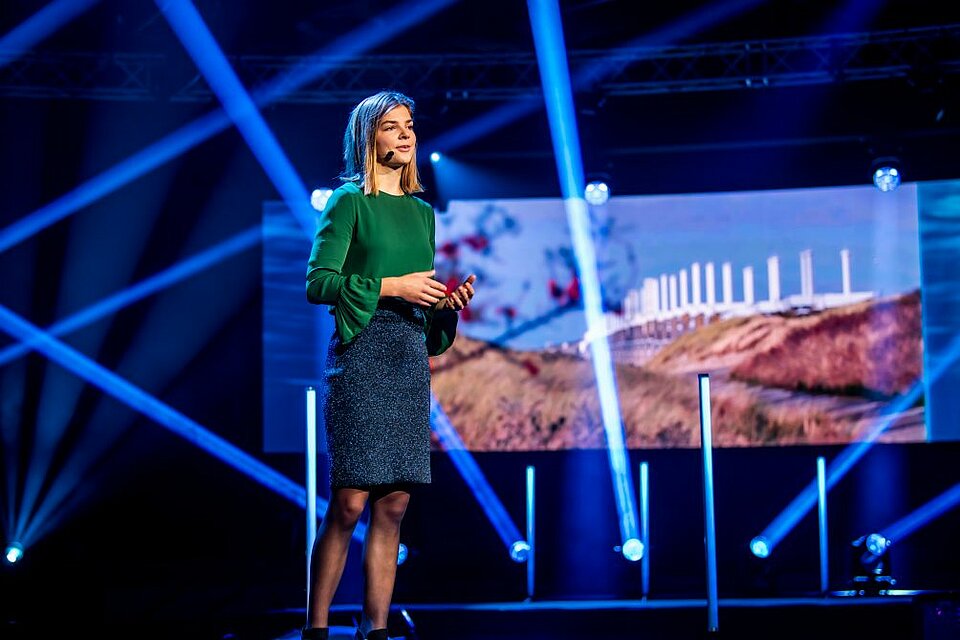First Tech Talk is “a promise for the future”

"Don't put any more money into old polluting solutions but continue to invest smartly in research and technology."
The Netherlands in 30 years: A prosperous country. We breathe clean air because everyone drives on solar energy. We eat vegetable food and we only need a few hospitals. Four students from the four Dutch technical universities gave their first “Tech Talk” on October 1. It represents their image of the Netherlands in 30 years’ time. An appeal to companies, the Dutch people, and to politicians to jointly embrace a delta plan for the coming decades.
Exactly because students delivered it, the Tech Talk is an immediate promise for the future, says Louise Fresco, chairman of the board of Wageningen University & Research. She is also chairman of the 4TU Federation, which unites the four technical universities of the Netherlands, Delft, Eindhoven, Twente, and Wageningen. This federation took the initiative for the Tech Talk. Fresco: “We wanted to tell a story like the Troonrede, the King’s annual speech at the beginning of the new political year. Not with those usual ‘important’ people, in the category of what I call ‘boring bobos’, but with young people because they are the future.”
Potential
The Federation wants to draw attention to the importance of technology, says Fresco. “Both for the enormous potential that exists in technological developments, for the importance of acceptance in society and, together with society, to look for new solutions and to see that as something positive.”
Prime Minister
The federation didn’t do this all by itself, but with other knowledge institutions and the business community. This is also evident from the opening video in which various experts point out the importance of technology. One of them is astronaut André Kuipers of the European Space Agency, who says that technology is everywhere. And Rogier van der Sanden, chairman of the Union of Water Boards, who believes that a delta plan should be drawn up so that we can still live safely in the Netherlands in 30 years’ time. In the run-up to the Tech Speech, the students also talked to Prime Minister Mark Rutte about the future of innovation.
According to Fresco, the Tech Talk is mainly an appeal to the cabinet and everyone else “that we need to speed up because we are lagging behind as a country.” According to Fresco, we are still focusing too much on the results of the past.
In the past few months, the Netherlands of 2050 has been examined and various experts have been interviewed. The honor of presenting the resulting Tech Talk went to students Robin Weijland of the University of Twente, Carijn Mulder of the TU Eindhoven, Pierre Verbakel of Wageningen University & Research, and Noa Ommering of the TU Delft. They were trained for their presentation by a theater director and two assistant directors.
Delta Plan
That preparation can be seen. After the online opening by Constantijn van Oranje, special envoy at TechLeap.nl, a non-profit organization that tries to speed up start-ups in technology, the students appear on stage full of dedication and conviction. Their story shows the resilience of the Netherlands after disasters and the current corona crisis. After the 1953 flood disaster, for example, a delta plan was drawn up to prevent such a disaster from occurring in the future.
“We thought 30, 40 years ahead and took the biggest approach, sometimes with technologies that were only just under development,” the students remember. But the delta plan turned out to have major consequences for nature. “By closing off the estuaries, mussels, salmon and sea trout could no longer reach the rivers and disappeared. Hydraulic engineers and ecologists built new techniques which created “an even better and more sustainable system”.
Having the guts
Passionately, students now look ahead to 2050 when their children ask them what they “did in 2020”. That they then want to be able to tell with pride that we have been working with a ‘delta plan’ for thirty years, in response to the major societal challenges in 2020 such as climate, health, mobility, nutrition, and the food system. “So that, in 2050, they will say: ‘Those people in 2020, they had the guts’.”
Bridges
Many innovations are already there, says Carijn Mulder, one of the keynote speakers, prior to the Tech Talk. Only science is still a black box for many people, says Mulder, a student of biomedical technology. “I think that technology will play an important role in the future, but the biggest barrier at the moment is in the interaction with people. According to Mulder, there is a lot of fear and unfamiliarity surrounding technology for a larger part of society. “In order to implement current technologies, the gap between science and society must be bridged.”


Mulder wants to make visible what technology means to society. That it is not just something for a few scientists. The Tech Talk emphasizes the need to implement the innovative technologies that exist and are yet to come. “We need to implement them together with politicians, society, and the whole business community.”
Show the possibilities
Education itself also plays an important role, says Mulder. “We, as students, have to show what is possible. That’s why Mulder was the team manager of the Solar Team Eindhoven until last year. Last year around this time, she was in Australia for the competition with the Stella Era solar car. Stella got the highest number of points and won the solar race.
“Our goal in such a competition is to show the possibilities of technology. That’s why the team makes a family car instead of a racing model, says Mulder. “To show that we are working on applicable and sustainable technologies in everyday life. The competition is a great platform, it attracts a lot of attention. Our goal is to show that sustainable mobility is possible, not necessarily to win the competition.”
Call
Together with her fellow students, Mulder called upon the business community, in addition to ‘society’, to “invest as much as possible in Research & Development, so that we can turn from a service economy into a knowledge economy”. She also addressed the banks and pension funds to “use your position as much as possible to invest in sustainable businesses and start-ups”. Politicians were also called upon to stick to innovation. “Don’t put any more money into old polluting solutions but continue to invest smartly in research and technology.”


The Dutch Prince Constantijn on Linkedin: Breaking news: The Tech Talk will not be repeated next year. In the first edition of 2020, everything has already been said. For 2021, there will be nothing left to say. There’s nothing left but to do it all now. The biggest success stories in the Netherlands have their origins in crises. Now is the chance to write the next story! Thanks, 4TU.Federation, for the great show!